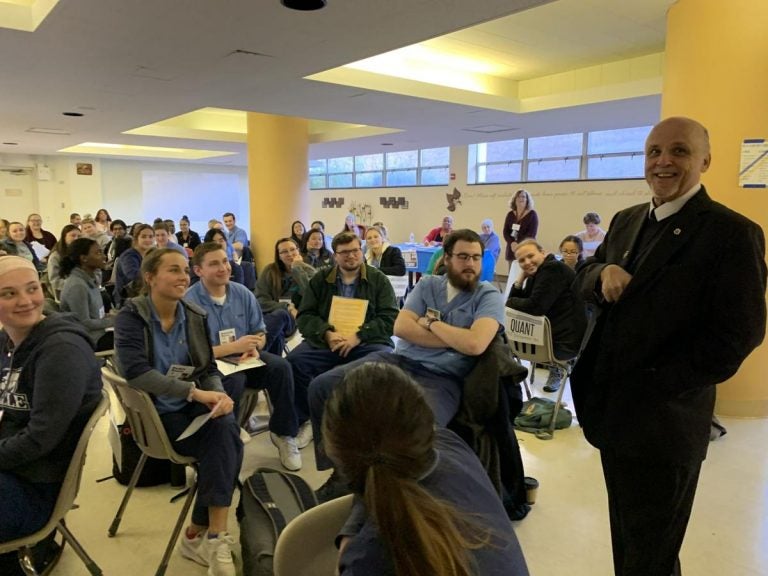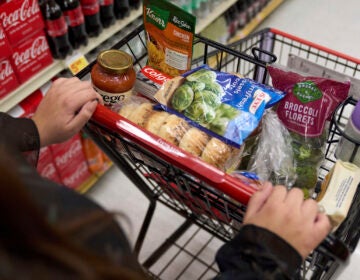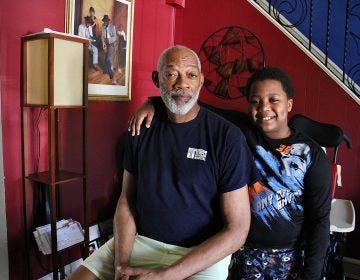Poor man’s game: Students take part in poverty simulation; realize importance of compassion
The ultimate goal was to make students more sensitive as graduated professionals to those grappling with the realities of being impoverished and to better meet their needs.

La Salle University nursing students and community leaders took part in a daylong poverty simulation to better understand the needs of the future patients they intend to serve. (Courtesy of La Salle University)
This story originally appeared on Philadelphia Weekly.
—
Their dad is in jail, and mom has up and left.
The oldest sibling had to drop out of college to take care of his three younger siblings. They have little money: a $100 financial aid check and another check for $200 but no bank account – so they had to take much less money at a check-cashing joint. They had to pawn nearly everything they owned to pay their expenses.
This is the scenario a group of La Salle University Graduate School of Nursing students was given Friday in a poverty simulation program aimed at giving participants an immersive experience in what it is like to live in poverty and survive week-to-week, said Patricia Dillon, chair of the Graduate Nursing Program and also of the Interprofessional Education Committee.
The ultimate goal was to make students more sensitive as graduated professionals to those grappling with the realities of being impoverished and to better meet their needs.
The program was supposed to represent one month in poverty, with four 15-minute periods where the families, comprised of nursing students, scurried around the room, visiting fictitious pawn shops, check-cashing establishments, health-care facilities, and mortgage companies, desperately trying to make ends meet on their limited budgets and to keep their families intact.
“What we’ve learned is it’s very hard to live with little to nothing, and people do this every day,” said Christian Lellig, 22, a student in the graduate school of nursing. “It’s really an eye-opener to how people live each day of their lives.”
Dillon said the simulation was right in line with the university’s mission of serving the underserved.
“Oftentimes in the hospital, we develop a plan of care for our patients and send them home with it, not understanding that they may not be able to follow that plan because of limited resources,” Dillon said. “So this simulation today is an opportunity to give them a sense of what that is like.”
Brandi Pergament, director of the La Salle University Speech-Language-Hearing Community Clinic, who was role-playing a mortgage collector, said that even though she knew she was participating in a simulation, emotionally she found the exercise hard.
“We evicted a family that had like seven children, which was not easy,” Pergament said. “The students were even shaking when they were handing us their money, and we were playing good cop today. If they gave us too much money, we gave it back. But I think it made them nervous, really nervous. They were really taking it seriously.”
“What we’ve learned is it’s very hard to live with little to nothing, and people do this every day. It’s really an eye-opener to how [some] people live each day of their lives.”
– Christian Lellig, 22, a student in La Salle University’s graduate school of nursing.
Dora Black, a community member who participated in the simulation with students, was in charge of distributing, among other cash-related items, SEPTA transpasses and loans. “I think they’re getting it,” Black said about the students. “I really do.”
According to Dillon, the program wouldn’t have worked without the community members who Dillon recruited at a health fair to participate in the simulation.
Just then someone came up to cash a paycheck. She finally got the entire amount because she had finally managed to pay off her school loan.
But after the simulation concluded, during the debriefing, several groups admitted to resorting to theft to get enough cash to live. One group sold its car that was paid off to get money for expenses and then stole another car so they would still have transportation.
Dr. Deborah Byrne, a member of the nursing school faculty who ran the pawn shop, told the students they were getting majorly ripped off during the simulation. “You guys have to learn how to haggle better. People coming in – they’re so desperate, they’ll take anything.
Dillon asked the room how many people wound up in jail. Many hands went up.
“Did your attitude change during the month?” Dillon asked. “How do you feel others responded to you?”
“They didn’t care,” one student said.
“They wouldn’t give change,” another added.
“They seem to be energized by this type of encounter, by this type of education,” said Superior General for the Institute of the Brothers of the Christian Schools, Brother Robert Schieler. He was paying a special visit to La Salle and sat in for part of the simulation.
“They’re not just sitting in a classroom at a desk or a table and somebody’s talking at them,” Schieler said. “They’re taking charge.”
Nursing student James McWilliam, 21, who was struggling with his group to meet their expenses, said he felt the simulation was “really real. The things that are thrown at us are things that I can see happening in real life.”
 This article is part of Broke in Philly, a collaborative reporting project among 23 news organizations, focused on Philadelphia’s push towards economic justice. Read more of our reporting at brokeinphilly.org.
This article is part of Broke in Philly, a collaborative reporting project among 23 news organizations, focused on Philadelphia’s push towards economic justice. Read more of our reporting at brokeinphilly.org.
WHYY is your source for fact-based, in-depth journalism and information. As a nonprofit organization, we rely on financial support from readers like you. Please give today.




